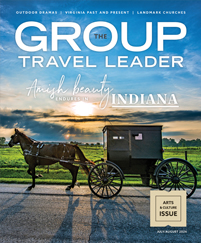Are the challenges in your life holding you back or pushing you forward?
I love David Letterman. From my teenager years until well into my 20s, I would tune in to his late-night show whenever I could, often when I should have been sleeping. Letterman’s comedy was hilarious but never cheap. He exercised a quick-witted, insightful and sincere sense of humor that nobody else on TV could match.
Those characteristics made Letterman not just a great comedian but also a great interviewer. The most memorable moments on his show came during the interview segments. He had a way of bringing out the best in his guests, giving them a platform to be the funniest or most compelling versions of themselves. With eight minutes of airtime and a few smart questions, he could make the audience love nearly anyone who sat on his couch.
Letterman retired from “The Late Show” in 2015 and took some time off from the entertainment business. Earlier this year, though, he returned to television, hosting a show called “My Next Guest Needs No Introduction” on Netflix. This show features long-form interviews with some of the most notable public figures of the day — people like Barack Obama, Tina Fey and George Clooney.
The show should be an interviewer’s dream. Letterman has as much time as he wants with each guest, and episodes frequently run longer than an hour. In this format, he gets to have the long conversations that he never could on late-night TV.
I was excited about the show when it debuted. But halfway through the first episode, I came to a surprising realization: It wasn’t working.
Without any time constraints, guests talked too long, getting bogged down as they went. Letterman asked follow-up questions that led the discussion away from compelling themes and into esoteric details. There was more time but less humor.
Watching these long interviews, it hit me: Letterman wasn’t a great interviewer in spite of his time constraints; he was a great interviewer because of them. The eight-minute format forced him to focus, stay sharp and get right to the point. He had to help his guests shine quickly because if they didn’t, his viewers would change the channel.
Often, the circumstances that seem to be holding us back are driving us forward. Once I noticed this on Letterman’s show, I began to see it everywhere. Most creative people do their best work while they’re laboring in obscurity, not after they’ve hit it big. Cash-strapped start-ups find innovative solutions because they have to; once they have money and resources, they seldom display the same creativity.
The principle at work here applies to all of us. As a travel planner, you’re up against a fair number of challenges. You don’t have the time, money or support you would like. Life would be easier if you had more resources at your disposal. But don’t let these constraints hold you back. Your limitations don’t have to stop you from succeeding. They can propel you to success.
The work you do is an important part of your ministry organizations and their missions. Travel can change lives and bring people closer to God and each other. Don’t let your circumstances stop that. The challenges you face could be the root of your greatest success.
Here at Going On Faith, we believe in travel. And we believe in you. So get out there and do your best work, no matter what is standing in your way.










